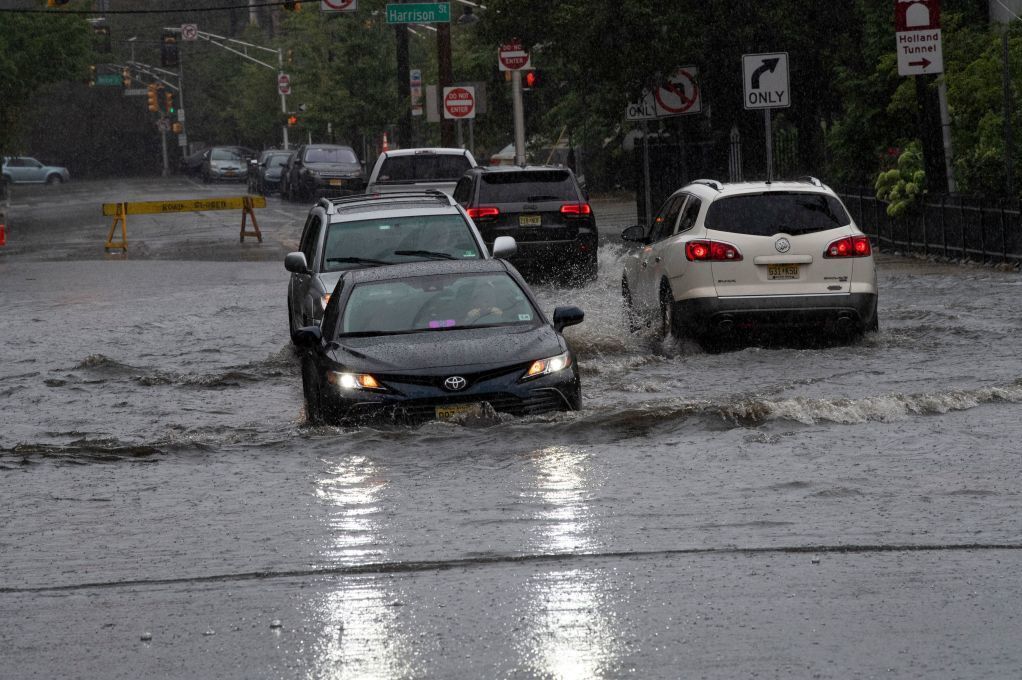Cars drive through flooded streets as Tropical Storm Henri approaches in Hoboken, New Jersey on August 22, 2021.
Kena Betancur/AFP via Getty Images
hide caption
toggle caption
Kena Betancur/AFP via Getty Images

Cars drive through flooded streets as Tropical Storm Henri approaches in Hoboken, New Jersey on August 22, 2021.
Kena Betancur/AFP via Getty Images
A federal appeals court has ruled that a pair of lawsuits seeking to hold oil companies accountable for the effects of climate change should be heard in state courts, nullifying efforts by the fossil fuel industry to bring the cases before federal judges.
While climate change ‘is a significant issue with national and global implications’, cases cannot be moved to federal courts ‘just because they are significant’, U.S. Circuit Court of Philadelphia Court of Appeals says August 17.
Lawyers representing the state of Delaware and the city of Hoboken, NJ, sued more than a dozen oil companies and an industry trade group in 2020 for allegedly misleading the public about the role that oil companies play. fossil fuels in climate change. The Delaware and Hoboken lawsuits are among more than 20 similar cases filed in the United States in recent years.
Fossil fuel companies have pushed largely unsuccessfully to have the lawsuits tried in federal court, rather than state courts, arguing that the issues in dispute are of national importance. The Aug. 17 ruling marked the fifth time a federal appeals court has blocked the oil industry from transferring such cases out of state courts, said Karen Sokol, a professor at Loyola University New Orleans College of Law.

“The first files were submitted in the summer of 2017, and the [fossil fuel] the industry has been pursuing this fight in jurisdictional battles for five years now,” Sokol says. tried in state court.”
Delaware and Hoboken accused the oil companies and the American Petroleum Institute (API) of violating various state laws, including consumer fraud laws. Consumer protection cases, including lawsuits involving alleged corporate disinformation campaigns by tobacco companies, have always been tried in state court.
“The oil companies are asking us to hear two broad climate change lawsuits. But the plaintiffs filed those lawsuits in state court based solely on state tort law,” the judge wrote. Stephanos Bibas for the Philadelphia Court of Appeals.

Heavy rain with stormy weather is seen in Jersey City in New Jersey, United States on September 1, 2021.
Tayfun Coskun/Anadolu Agency via Getty Images
hide caption
toggle caption
Tayfun Coskun/Anadolu Agency via Getty Images

Heavy rain with stormy weather is seen in Jersey City in New Jersey, United States on September 1, 2021.
Tayfun Coskun/Anadolu Agency via Getty Images
Delaware said sea level rise caused by climate change would threaten more than $1 billion in real estate value, with flooding expected to hit areas with high poverty rates particularly hard. Hoboken said it is seeking hundreds of millions of dollars to cover current and future costs associated with climate change adaptation, remediation and economic loss.
A spokeswoman for Delaware Attorney General Kathy Jennings said her office agreed with the appeals court’s decision.
Chevron spokesman Bill Turenne said the cases belong in federal court “because of their significant implications for national energy policy, national security, foreign policy and other unique federal interests.”
“Climate change is a global phenomenon requiring a coordinated federal policy response, not a patchwork of legal action,” Turenne said in an emailed statement. “As the Court noted, [the] the decision involved a question of jurisdiction; we look forward to ruling on the overall merits of these cases.”
Ryan Meyers, API’s general counsel, called the lawsuits “a huge waste of taxpayers’ resources”. Climate change policy is ultimately “a matter for Congress to debate, not the judiciary,” he added.
An Exxon Mobil spokesperson said the company was “reviewing the decision and evaluating next steps.” Other oil companies named in the Delaware and Hoboken lawsuits declined to comment or did not respond to messages seeking comment.

Climate advocates welcomed the appeals court’s decision. “Polluters who have spent decades lying about their products’ role in fueling the climate crisis are terrified of facing the consequences of their actions and have desperately tried to avoid the courts of state,” said Richard Wiles, president of the Center for Climate Integrity. in a report. “But once again the appeals courts have rejected Big Oil’s attempts to escape liability.”
In addition to fighting lawsuits on jurisdictional grounds, the fossil fuel industry is pushing for states to pass laws that would prevent municipalities from suing companies for climate change-related damages, according to the Center for Climate Integrity, a monitoring group.
The Institute for Legal Reform of the United States Chamber of Commerce has advocated for such measures. “Armed with new theories of liability and backed by a slew of contingency-fee private attorneys, municipal plaintiffs remain an ongoing and disruptive threat to business,” the group said in a 2021 report.
Since 2019, municipal litigation preemption bills have been introduced in Arizona, Florida, Ohio and Kansas, and one has passed in Texas, according to the Center for Climate Integrity.
“There are several fronts to ensure that [cases] never gets to the bottom,” Sokol says, adding that the fossil fuel industry seeks “total immunity” from corporate liability.



